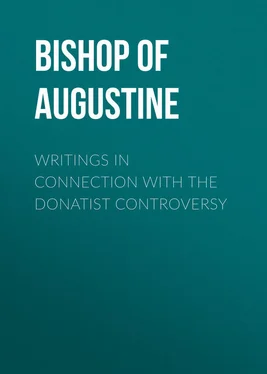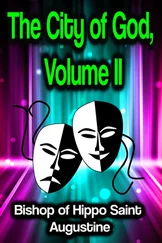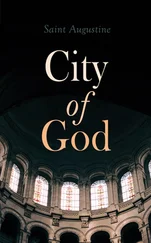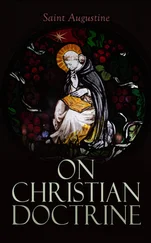Saint Augustine - Writings in Connection with the Donatist Controversy
Здесь есть возможность читать онлайн «Saint Augustine - Writings in Connection with the Donatist Controversy» — ознакомительный отрывок электронной книги совершенно бесплатно, а после прочтения отрывка купить полную версию. В некоторых случаях можно слушать аудио, скачать через торрент в формате fb2 и присутствует краткое содержание. Жанр: foreign_antique, foreign_prose, на английском языке. Описание произведения, (предисловие) а так же отзывы посетителей доступны на портале библиотеки ЛибКат.
- Название:Writings in Connection with the Donatist Controversy
- Автор:
- Жанр:
- Год:неизвестен
- ISBN:нет данных
- Рейтинг книги:3 / 5. Голосов: 1
-
Избранное:Добавить в избранное
- Отзывы:
-
Ваша оценка:
- 60
- 1
- 2
- 3
- 4
- 5
Writings in Connection with the Donatist Controversy: краткое содержание, описание и аннотация
Предлагаем к чтению аннотацию, описание, краткое содержание или предисловие (зависит от того, что написал сам автор книги «Writings in Connection with the Donatist Controversy»). Если вы не нашли необходимую информацию о книге — напишите в комментариях, мы постараемся отыскать её.
Writings in Connection with the Donatist Controversy — читать онлайн ознакомительный отрывок
Ниже представлен текст книги, разбитый по страницам. Система сохранения места последней прочитанной страницы, позволяет с удобством читать онлайн бесплатно книгу «Writings in Connection with the Donatist Controversy», без необходимости каждый раз заново искать на чём Вы остановились. Поставьте закладку, и сможете в любой момент перейти на страницу, на которой закончили чтение.
Интервал:
Закладка:
3. But if they say that the Catholic Church existed then, because there were a few, or, if they prefer it, even a considerable number, who denied the validity of any baptism conferred in an heretical body, and baptized all who came from thence, what then? Did the Church not exist at all before Agrippinus, with whom that new kind of system began, at variance with all previous custom? Or how, again, after the time of Agrippinus, when, unless there had been a return to the primitive custom, there would have been no need for Cyprian to set on foot another Council? Was there no Church then, because such a custom as this prevailed everywhere, that the baptism of Christ should be considered nothing but the baptism of Christ, even though it were proved to have been conferred in a body of heretics or schismatics? But if the Church existed even then, and had not perished through a breach of its continuity, but was, on the contrary, holding its ground, and receiving increase in every nation, surely it is the safest plan to abide by this same custom, which then embraced good and bad alike in unity. But if there was then no Church in existence, because sacrilegious heretics were received without baptism, and this prevailed by universal custom, whence has Donatus made his appearance? from what land did he spring? or from what sea did he emerge? or from what sky did he fall? And so we, as I had begun to say, are safe in the communion of that Church, throughout the whole extent of which the custom now prevails, which prevailed in like manner through its whole extent before the time of Agrippinus, and in the interval between Agrippinus and Cyprian, and whose unity neither Agrippinus nor Cyprian ever deserted, nor those who agreed with them, although they entertained different views from the rest of their brethren, – all of them remaining in the same communion of unity with the very men from whom they differed in opinion. But let the Donatists themselves consider what their true position is, if they neither can say whence they derived their origin, if the Church had already been destroyed by the plague-spot of communion with heretics and schismatics received into her bosom without baptism; nor again agree with Cyprian himself, for he declared that he remained in communion with those who received heretics and schismatics, and so also with those who were received as well: while they have separated themselves from the communion of the whole world, on account of the charge of having delivered up the sacred books, which they brought against the men whom they maligned in Africa, but failed to convict when brought to trial beyond the sea; although, even had the crimes which they alleged been true, they were much less heinous than the sins of heresy and schism; and yet these could not defile Cyprian in the persons of those who came from them without baptism, as he conceived, and were admitted without baptism into the Catholic communion. Nor, in the very point in which they say that they imitate Cyprian, can they find any answer to make about acknowledging the baptism of the followers of Maximianus, together with those whom, though they belonged to the party that they had first condemned in their own general Council, and then gone on to prosecute even at the tribunal of the secular power, they yet received back into their communion, in the episcopate of the very same bishop under whom they had been condemned. Wherefore, if the communion of wicked men destroyed the Church in the time of Cyprian, they have no source from which they can derive their own communion; and if the Church was not destroyed, they have no excuse for their separation from it. Moreover, they are neither following the example of Cyprian, since they have burst the bond of unity, nor abiding by their own Council, since they have recognised the baptism of the followers of Maximianus.
Chap. iii – 4. Let us therefore, seeing that we adhere to the example of Cyprian, go on now to consider Cyprian's Council. What says Cyprian? "Ye have heard," he says, "most beloved colleagues, what Jubaianus our fellow-bishop has written to me, consulting my moderate ability concerning the unlawful and profane baptism of heretics, and what answer I gave him, – giving a judgment which we have once and again and often given, that heretics coming to the Church ought to be baptized and sanctified with the baptism of the Church. Another letter of Jubaianus has likewise been read to you, in which, agreeably to his sincere and religious devotion, in answer to our epistle, he not only expressed his assent, but returned thanks also, acknowledging that he had received instruction." 115 115 See above, II. ii. 3.
In these words of the blessed Cyprian, we find that he had been consulted by Jubaianus, and what answer he had given to his questions, and how Jubaianus acknowledged with gratitude that he had received instruction. Ought we then to be thought unreasonably persistent, if we desire to consider this same epistle by which Jubaianus was convinced? For till such time as we are also convinced (if there are any arguments of truth whereby this can be done), Cyprian himself has established our security by the right of Catholic communion.
5. For he goes on to say: "It remains that we severally declare our opinion on this same subject, judging no one, nor depriving any one of the right of communion if he differ from us." He allows me, therefore, without losing the right of communion, not only to continue inquiring into the truth, but even to hold opinions differing from his own. "For no one of us," he says, "setteth himself up as a bishop of bishops, or by tyrannical terror forceth his colleagues to a necessity of obeying." What could be more kind? what more humble? Surely there is here no authority restraining us from inquiry into what is truth. "Inasmuch as every bishop," he says, "in the free use of his liberty and power, has the right of forming his own judgment, and can no more be judged by another than he can himself judge another," – that is, I suppose, in those questions which have not yet been brought to perfect clearness of solution; for he knew what a deep question about the sacrament was then occupying the whole Church with every kind of disputation, and gave free liberty of inquiry to every man, that the truth might be made known by investigation. For he was surely not uttering what was false, and trying to catch his simpler colleagues in their speech, so that, when they should have betrayed that they held opinions at variance with his, he might then propose, in violation of his promise, that they should be excommunicated. Far be it from a soul so holy to entertain such accursed treachery; indeed, they who hold such a view about such a man, thinking that it conduces to his praise, do but show that it would be in accordance with their own nature. I for my part will in no wise believe that Cyprian, a Catholic bishop, a Catholic martyr, whose greatness only made him proportionately humble in all things, so as to find favour before the Lord, 116 116 Ecclus. iii. 18.
should ever, especially in the sacred Council of his colleagues, have uttered with his mouth what was not echoed in his heart, especially as he further adds, "But we must all await the judgment of our Lord Jesus Christ, who alone has the power both of setting us in the government of His Church, and of judging of our acts therein." 117 117 See above, II. ii. 3.
When, then, he called to their remembrance so solemn a judgment, hoping to hear the truth from his colleagues, would he first set them the example of lying? May God avert such madness from every Christian man, and how much more from Cyprian! We have therefore the free liberty of inquiry granted to us by the most moderate and most truthful speech of Cyprian.
Chap. iv. – 6. Next his colleagues proceed to deliver their several opinions. But first they listened to the letter written to Jubaianus; for it was read, as was mentioned in the preamble. Let it therefore be read among ourselves also, that we too, with the help of God, may discover from it what we ought to think. "What!" I think I hear some one saying, "do you proceed to tell us what Cyprian wrote to Jubaianus?" I have read the letter, I confess, and should certainly have been a convert to his views, had I not been induced to consider the matter more carefully by the vast weight of authority, originating in those whom the Church, distributed throughout the world amid so many nations, of Latins, Greeks, barbarians, not to mention the Jewish race itself, has been able to produce, – that same Church which gave birth to Cyprian himself, – men whom I could in no wise bring myself to think had been unwilling without reason to hold this view, – not because it was impossible that in so difficult a question the opinion of one or of a few might not have been more near the truth than that of more, but because one must not lightly, without full consideration and investigation of the matter to the best of his abilities, decide in favour of a single individual, or even of a few, against the decision of so very many men of the same religion and communion, all endowed with great talent and abundant learning. And so how much was suggested to me on more diligent inquiry, even by the letter of Cyprian himself, in favour of the view which is now held by the Catholic Church, that the baptism of Christ is to be recognised and approved, not by the standard of their merits by whom it is administered, but by His alone of whom it is said, "The same is He which baptizeth," 118 118 John i. 33.
will be shown naturally in the course of our argument. Let us therefore suppose that the letter which was written by Cyprian to Jubaianus has been read among us, as it was read in the Council. 119 119 The Council of Carthage.
And I would have every one read it who means to read what I am going to say, lest he might possibly think that I have suppressed some things of consequence. For it would take too much time, and be irrelevant to the elucidation of the matter in hand, were we at this moment to quote all the words of this epistle.
Интервал:
Закладка:
Похожие книги на «Writings in Connection with the Donatist Controversy»
Представляем Вашему вниманию похожие книги на «Writings in Connection with the Donatist Controversy» списком для выбора. Мы отобрали схожую по названию и смыслу литературу в надежде предоставить читателям больше вариантов отыскать новые, интересные, ещё непрочитанные произведения.
Обсуждение, отзывы о книге «Writings in Connection with the Donatist Controversy» и просто собственные мнения читателей. Оставьте ваши комментарии, напишите, что Вы думаете о произведении, его смысле или главных героях. Укажите что конкретно понравилось, а что нет, и почему Вы так считаете.












